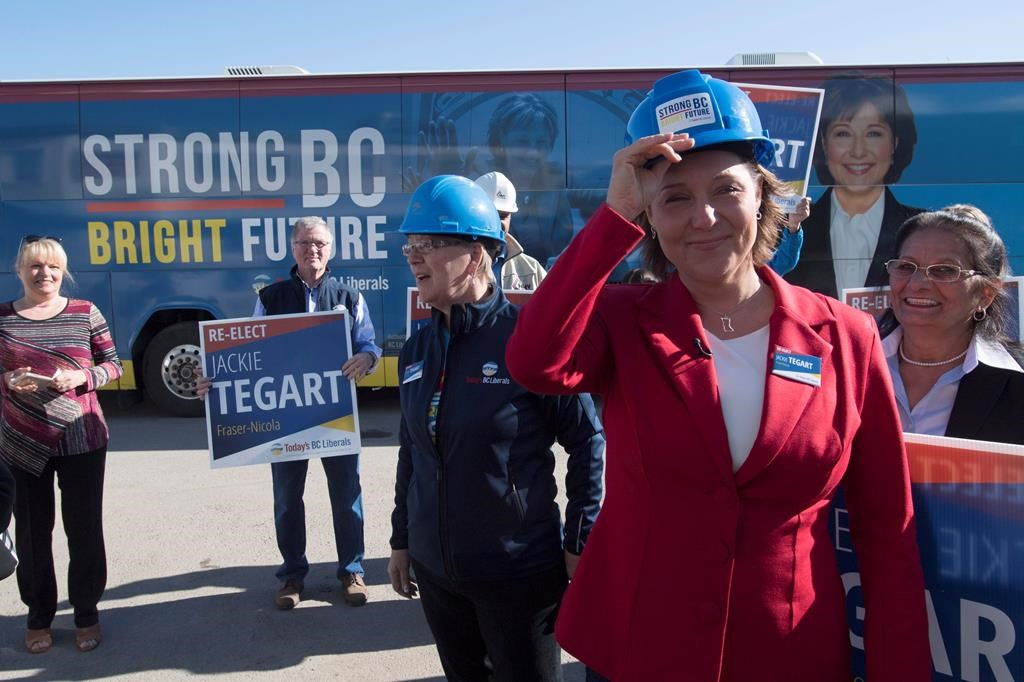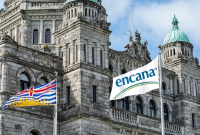Support strong Canadian climate journalism for 2025
Environmentalists expressed shock and outrage on Monday over revelations from internal documents that suggested that British Columbia's plan to tackle climate pollution was written in the boardrooms of big oil and gas companies in Alberta.
In 2015, former premier Christy Clark's government created the Climate Leadership Team. A group of 17 industry, First Nations, community and environmental experts were given support from government analysts and asked to develop joint recommendations for a provincial climate plan promised for March 2016. The team was tasked with submitting specific recommendations in time for Clark to promote at the historic UN climate talks in Paris. The team got the job done and Clark flew to Paris in November 2015 where she and former environment minister Mary Polak gave public talks about their climate team and met with then-UN Secretary-General Ban Ki Moon.
But later, as the March deadline passed with the provincial plan nowhere in sight, climate team members grew alarmed. Finally, in August, the province unveiled a plan which ignored the climate team's recommendations, leading disappointed team members to publicly criticize it.
Documents obtained through Freedom of Information requests by the Canadian Centre for Policy Alternatives reveal fresh details about what happened during that time. Even as the Paris negotiations were underway, the B.C. government was organizing a secret process to rewrite the team's recommendations with some of the biggest oil and gas companies, many of which were major donors to the governing BC Liberal Party.
The documents show that provincial officials travelled to Calgary to hold five rounds of secret meetings over three months in the boardroom of the Canadian Association of Petroleum Producers (CAPP). Representatives from Alberta-based oil giants Encana and Canadian Natural Resources Ltd (CNRL) are shown on the list of participants meeting with B.C.'s ministry of natural gas development.
"It's shocking," said Tzeporah Berman, a prominent environmental advocate and York University adjunct professor who was among the members of Clark's climate team.
"These documents show that the Liberal government had allowed the oil and gas industry to control the development of climate policy in our province."
"It's offensive to democracy," said CCPA associate director Shannon Daub, who filed the access to information request. She said the findings show a need to rewrite B.C.'s rules around political contributions, which the BC NDP government is setting in motion this week with a bill to limit individual donations to $1,200 and ban corporate and union donations..
"The fact that Christy Clark’s government created a climate plan that didn’t adopt even one of the Climate Leadership Team recommendations really says it all," said Clean Energy Canada executive director Merran Smith.
Encana and CNRL didn't immediately respond to requests for comment from National Observer regarding the newly-released documents.
"Of course it's important for all industries to have the ability to comment on the impact of climate policy," B.C.'s new NDP Environment Minister George Heyman, a former executive director of Sierra Club B.C., said in a phone call to National Observer. "But we have to be fair and open and transparent to all people of all sectors...in an open and transparent manner that doesn't give preference or special access to any group."
Brad Herald, vice president of Western Canada operations at CAPP, strongly disagreed with the characterization that oil and gas companies helped shape B.C.'s climate plan, saying the meetings were only a consulation in which the industry gave their feedback as part of a multi-stakeholder discussion.
"We weren't invited to the Climate Leadership Team, but we're a very important sector of the B.C. economy," Herald said. "We represent the oil and gas sector in Canada and we are more than happy to offer our input in the process...we pushed hard and said, 'Let's get details on this as quickly as possible.'"
Alberta's money and influence in B.C.
The FOI hints at the influence of political donations from Alberta on B.C.'s public policy.
In March 2015, National Observer reported that Alberta-based oil and gas companies had actually given more to the BC Liberals than to the Alberta Progressive Conservative Party, due to B.C.'s lack of limits on political contributions.
Encana, one of the participants in the Calgary meetings around the Climate Leadership Plan recommendations, was a major donor, gifting $670,316 to the BC Liberals from 2011 to 2017, according to Elections BC. Its founding CEO Gwyn Morgan, a former advisor to Clark, had given the BC Liberals $197,400 since 2011. Also present was CNRL, another oil giant that has contributed $112,700 to the BC Liberals, and N. Murray Edwards, a 37.5 per cent-shareholder of Imperial Metals and chairman to the oilsands giant CNRL. He raised more than $1 million in a private fundraiser in Calgary for Christy Clark's re-election bid in 2014.
Berman said it was bizarre that B.C.'s policy on climate was being shaped in Calgary, rather than in Victoria. According to the document, multiple meetings took place in Calgary during the time the B.C. government was meant to be working on a plan around the climate team's recommendations. Although the CCPA requested minutes from the meetings, none were released. The FOI reveals that participants in Calgary were working on the "language" of the climate plan and how to "add detail and direction" to B.C.'s climate policy.
"Can you imagine if Albertans had documents reveal secret meetings where their public policy was designed in Vancouver? People would be lighting their hair on fire," Berman said. "And so should British Columbians."
Herald argued that the meetings were only held in Alberta because there were around three B.C. participants in the meetings compared to 22-25 participants from companies headquartered in Calgary, and said no one believed there was a problem with having the meetings in the CAPP boardroom. He said he didn't think the influence of oil and gas companies played a significant role in the way the way officials drafted B.C.'s climate plan was drafted.
"Ultimately, it's the sovereignty of elected officials to make those determinations," Herald said. "We were a very significant player in that space. We gave our input, the Climate Leadership Team gave their input, and the government of B.C. as I would expect, are held to account for those decisions every four years. [The BC Liberals] tried to create a balanced outcome that both cut emissions and grew the economy. We think both these things are possible. It's not a binary choice. "
He said he understands donations from Alberta to B.C.'s political parties were a "significant election issue" and that for each jurisdiction, CAPP closely followed the rules and regulations around lobbying.
The end of the "wild west"?
Daub said the findings of the FOI underscore how necessary the reforms are to limit large donations to political parties in B.C. The lack of limits and regulations around B.C.'s political donations drew global attention last year when The New York Times called B.C. "The 'Wild West' of Canadian political cash," where anyone from Chinese real estate developers to Albertan oil companies could donate to political parties meant to represent British Columbians' best interests.
Whereas the oil and gas industry appeared to meet at least four times from December through February 2016 to discuss how to shape a plan in response to the Climate Leadership Plan recommendations, Smith said the Climate Leadership Team did not get much face time with the B.C. government after the recommendations were submitted.
"We had very few meetings with the B.C. government once the recommendations were created," Smith said, noting it was clear there was "very little interest" in shaping a plan around the team's suggestions.
"The silver lining is that we still have a good, solid set of climate action recommendations sitting there, and we now have a premier and government who is interested in taking climate action and building a clean growth economy for the twenty-first century."

Editor's Note: This story was updated at 5:05 p.m. to include statements from the Canadian Association of Petroleum Producers. It was updated again to include comments from Minister George Heyman and CAPP Western Canada operations vice president Brad Herald.




Comments
Too bad the main stream media is incapable of asking these hard questions. The oil and gas industry is getting away with environmental murder and their effective PR campaign has them painted as the engine of the economy that doesn't REALLY have a bad track record. Tell that to people living near pipelines, fracking operations or train tracks. And the newest thing is to ignore the well abandonment process so there is no clear idea how big the future cleanup will be. Just another way of moving future liabilities onto the general taxpayer.
Hi StoriesHave, if you are currently living near pipelines or fracking operations and want to share a story that sheds light on a unique aspect of this issue, please write me or send us a Facebook message. Thanks for your comment.